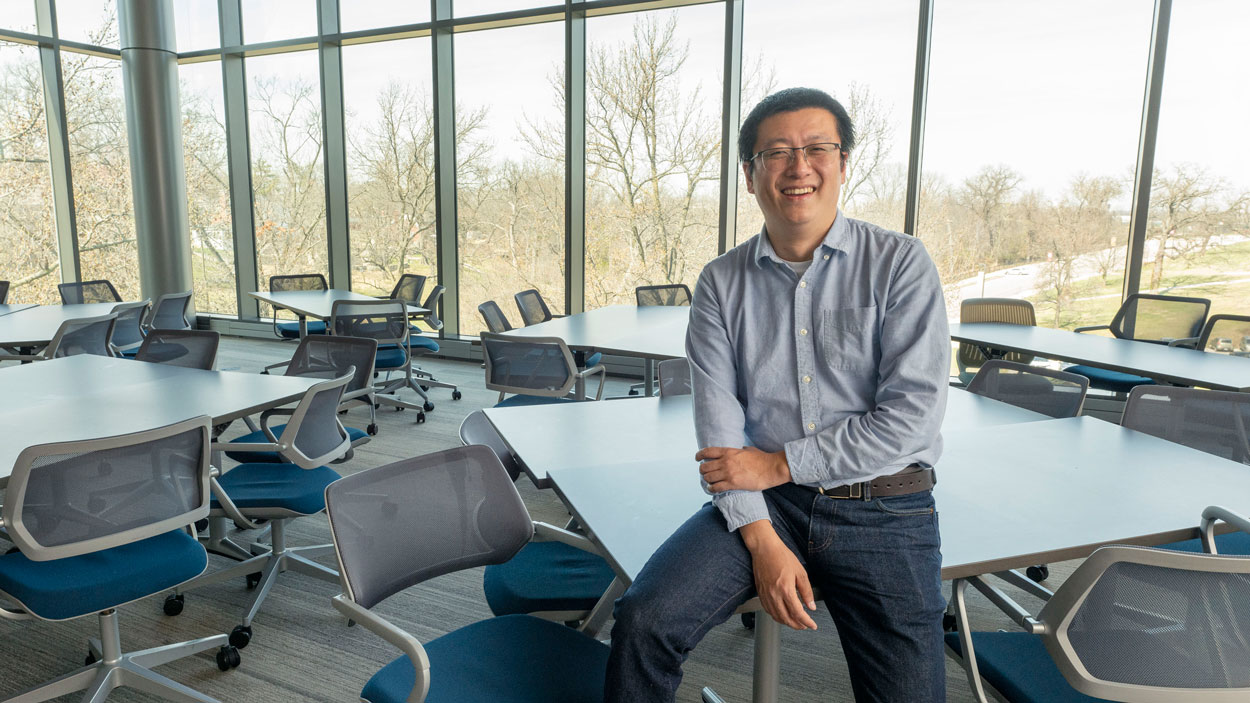
Assistant Professor Lei (Jeremy) Xu and his collaborators gained insight into factors that help facilitate new venture creation after examining a longitudinal sample of regional data from the United States between 1994 and 2016, and they published their findings in the Academy of Management Journal. (Photo by Derik Holtmann)
The presence of venture capital is often viewed as paramount to building a successful entrepreneurial ecosystem.
Policymakers work to make policies and regulations to help attract private equity to their regions, and politicians are quick to tout the achievement when investors arrive.
But new research conducted by University of Missouri–St. Louis Assistant Professor Lei (Jeremy) Xu in collaboration with colleagues at Hofstra University, Erasmus University Rotterdam, Baruch College in New York and Texas Tech University suggests that venture capital inflows alone can’t guarantee a thriving entrepreneurial ecosystem and, in fact, can in some cases stifle regional entrepreneurship.
Xu, a member of the faculty in the Department of Marketing and Entrepreneurship in the College of Business Administration, and his collaborators, Shu Yang, Yu Liu, Scott L. Newbert and Kimberly Boal, published their findings in a December article, titled “Seeing the Forest and the Trees: Exploring the Impact of Inter- and Intra-Entrepreneurial Ecosystem Embeddedness on New Venture Creation,” in the Academy of Management Journal.
“There’s always a saying among the policymakers that if they want to promote local high-tech entrepreneurship, the more venture capital we bring to the region – the more resources they’re exposed to – the better,” Xu said. “We’re trying to challenge this policymaking logic by saying that more is not necessarily better.”
Xu, who earned his PhD at Texas Tech, started looking more closely at the role of venture capital investments in fostering early stage entrepreneurship after joining the faculty at the University of Wisconsin–Whitewater shortly after completing his doctorate in 2019.
The job brought him nearer to Green Bay, Wisconsin. He remembers following news coverage and seeing officials involved in regional government working in concert with officials in state and federal government to try to promote Green Bay as an entrepreneurial hub.
“They kept saying, ‘Let’s bring more venture capital firms in the region,’” Xu said. “But over time, we do not see this kind of prosperous entrepreneurial development there. That actually triggered my initial interest for this project.” In the findings, they found that there exists an inverted U-shaped relationship between venture capital investment inflows in a region and new venture creation in the region.
He and his collaborators examined a longitudinal sample of regional data from the United States between 1994 and 2016 and uncovered compelling insights into the forces driving new venture creation. These include socio-cognitive forces, such as the number of public companies that are headquartered in a given region that can absorb or diffuse resources, as well as social interactions within the entrepreneurial ecosystem, proxied by religiosity in a region, which facilitate localized trust. While the former steepens the inverted U-shaped relationship, the latter flattens out such primary relationship.
“Currently, a lot of places, whether in Missouri, Wisconsin, Austin or Dallas in Texas, they’re all trying to model after Silicon Valley,” Xu said. “You cannot copy Silicon Valley. One of the issues is the key social-cultural factors within Silicon Valley, which can make it self-sustaining.”
Those socio-cultural factors were created over time – going back to the 1970s and ’80s – and are built into the business environment in a region that grew technology giants such as Apple, Google and Facebook/Meta. They are not easily replicated.
Xu also notes that one of the things that has made Silicon Valley so successful as a hub of new venture creation is that it has attracted and welcomed talent from outside the region – including people from overseas, many of whom arrive at the region’s universities – and have nurtured their growth.
Silicon Valley does not have an urgent need for venture capital inflows because of the ecosystem’s long history of fostering innovation. But Xu also believes that all those investors can work against discovering and supporting the growth of the next big idea.
“Venture capital firms only care about what can be commercialized,” Xu said. “They might only support certain types of businesses or commercialize certain types of businesses in one region. That will stifle all other entrepreneurial activities because such entrepreneurs will not be supported. If they will not be supported, they will be discouraged. Therefore, they will decide to take a ‘wait-and-see’ approach.”
There have been many reports of tech startups fleeing Silicon Valley for opportunities in Austin or Dallas, and Xu noted that many of the leading companies developing the technology around artificial intelligence have grown up outside the Bay Area or even the United States.
Xu believes his research can provide valuable guidance for policymakers seeking to promote regional entrepreneurship. It is important for them to prioritize venture capital investment from beyond their regions, but too much external investment beyond an optimal level can yield negative returns.
“Policymakers are urged to adopt a tailored approach,” Xu said, “considering the unique characteristics of each entrepreneurial ecosystem by following a coherent framework, to maximize the effectiveness of entrepreneurship-stimulating initiatives.”
As Xu continues his research, he plans to explore the origins of entrepreneurial ecosystems.














